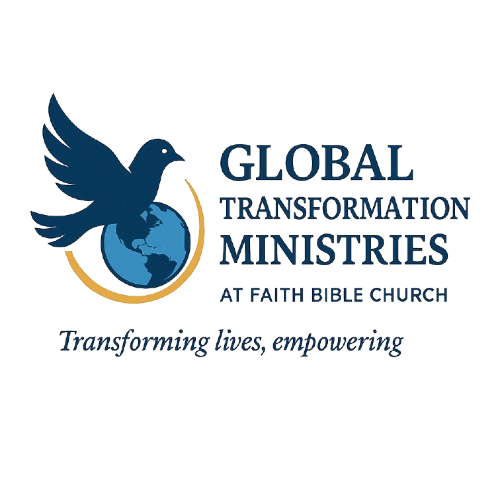Archive for vivian.atud@gmail.com
- Home » Archives for vivian.atud@gmail.com
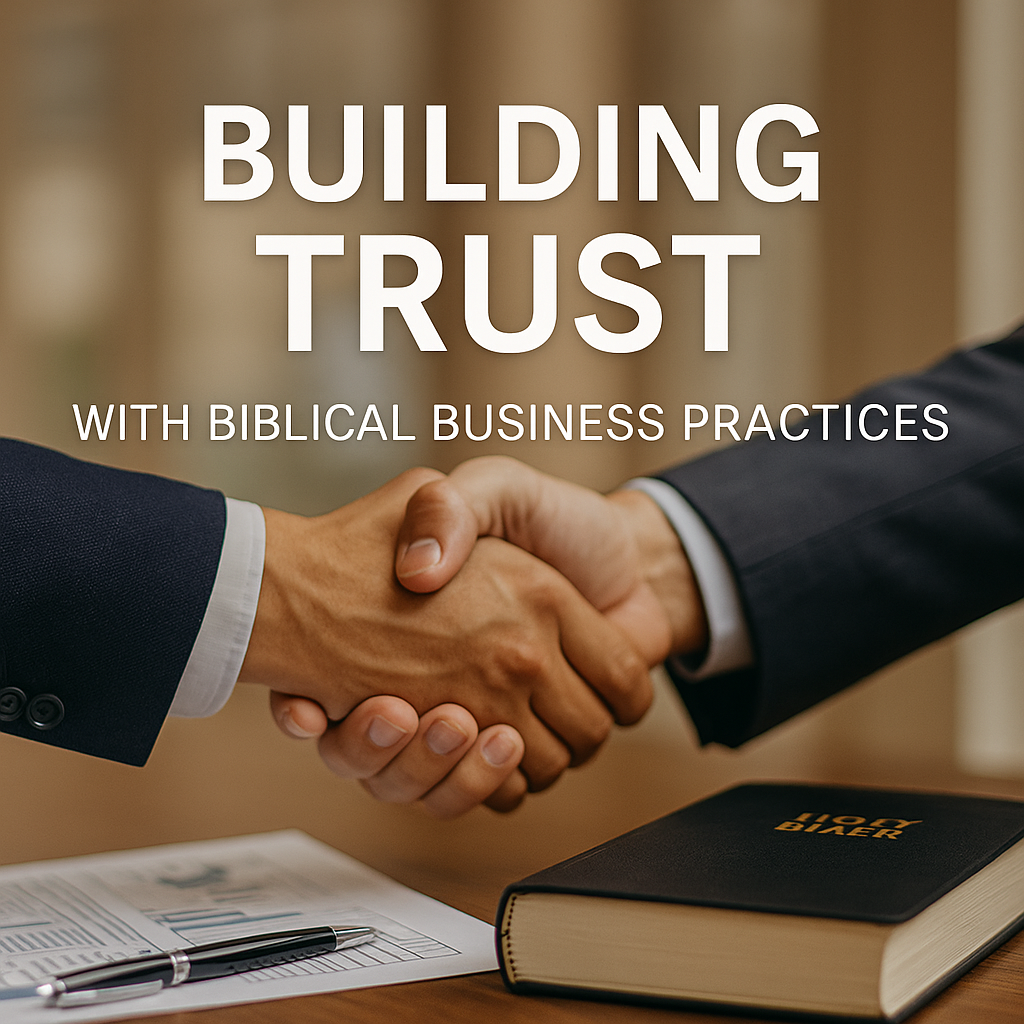
Building Trust with Biblical Business Practices
Building Trust with Biblical Business Practices Heading Level Title / Subheading H1 Building Trust with Biblical Business Practices H2 Introduction: Why Trust Matters in Business H2 Biblical Foundations of Trust in Work and Trade H3 God as the Ultimate Standard of Integrity H3 Old Testament Guidance on Fairness and Honesty H3 New Testament Teachings on Work, Service, and Trust H2 Core Biblical Business Practices That Build Trust H3 Honesty and Transparency in Dealings H3 Fair Wages and Respect for Workers H3 Servant Leadership and Humility H3 Stewardship and Accountability H2 Practical Applications for Modern Christian Business Leaders H3 Ethical Marketing and Communication H3 Responsible Supply Chain and Resource Management H3 Faith-Inspired Human Resource Practices H3 Financial Transparency and Integrity H2 Case Studies of Trust-Building Businesses H3 Historical Examples: Quakers and Early Christian Merchants H3 Modern Companies Guided by Faith Principles H2 The Role of Accountability and Community in Business H3 Internal Accountability Structures H3 External Partnerships and Witness H2 Challenges to Biblical Business Practices in Today’s World H3 Consumerism and Profit-First Culture H3 Globalization and Ethical Dilemmas H3 The Pressure of Moral Relativism H2 Integrating Faith and Business for Kingdom Impact H3 Business as Mission (BAM) H3 Kingdom Economics and Social Impact H3 Building Eternal Legacies Through Trust H2 FAQs on Building Trust with Biblical Business Practices H2 Conclusion: A Call to Faithful Business Stewardship Building Trust with Biblical Business Practices Building Trust with Biblical Business Practices Introduction: Why Trust Matters in Business In today’s global marketplace, trust is one of the most valuable currencies. Scandals, corruption, and broken promises have eroded public confidence in corporations and institutions. Yet, businesses rooted in biblical principles of honesty, service, and stewardship stand apart as beacons of reliability. As an academic with more than fifty years of experience at Harvard University and in ministry with Global Transformation Ministries (GTM), I have witnessed how biblical business practices not only strengthen organizations but also reflect Christ’s kingdom in the world. This article explores how building trust through biblical business practices transforms both companies and communities—demonstrating that faith and commerce are not in conflict, but deeply complementary. Biblical Foundations of Trust in Work and Trade God as the Ultimate Standard of Integrity Scripture declares: “God is not human, that he should lie” (Numbers 23:19). Trust originates in God’s unchanging character. In business, Christians mirror God’s trustworthiness when they act with integrity and consistency. Old Testament Guidance on Fairness and Honesty Ancient commerce often relied on literal scales, and God demanded fairness in trade. Today, the principle applies to fair pricing, honest contracts, and transparent operations. New Testament Teachings on Work, Service, and Trust Trustworthiness in the New Testament is rooted in sincerity, faithful service, and consistency in word and action. Core Biblical Business Practices That Build Trust Honesty and Transparency in Dealings Ephesians 4:25 commands believers to “put off falsehood and speak truthfully.” Businesses build trust when they avoid misleading claims, disclose accurate information, and uphold clarity in all agreements. Fair Wages and Respect for Workers James 5:4 condemns withholding wages from laborers. Modern applications include: Respecting workers reflects Christ’s love and strengthens organizational trust. Servant Leadership and Humility Jesus declared: “Whoever wants to become great among you must be your servant” (Mark 10:43). Christian leaders build trust not by wielding power but by serving employees, customers, and communities. Stewardship and Accountability The Parable of the Talents (Matthew 25:14–30) illustrates that leaders are stewards, not owners. Businesses must manage finances, people, and resources responsibly, accountable both to God and stakeholders. Practical Applications for Modern Christian Business Leaders Ethical Marketing and Communication Truthful advertising, transparent contracts, and customer care policies demonstrate integrity. Trust grows when promises match performance. Responsible Supply Chain and Resource Management Biblical stewardship requires evaluating whether suppliers exploit labor, damage creation, or operate unjustly. Ethical supply chains honor God and protect trust. Faith-Inspired Human Resource Practices Training, mentorship, and employee care rooted in biblical principles nurture loyalty. Leaders who pray with teams, provide flexibility for family, and uphold Sabbath rest embody trust-building practices. Financial Transparency and Integrity Clear accounting, honest reporting, and avoidance of corrupt practices reflect Proverbs 10:9: “Whoever walks in integrity walks securely.” Case Studies of Trust-Building Businesses Historical Examples: Quakers and Early Christian Merchants In the 18th century, Quaker merchants became trusted global traders because they avoided dishonest practices, honored contracts, and treated workers fairly. Their reputation made “Quaker goods” a byword for trust. Modern Companies Guided by Faith Principles These examples show how biblical trust practices create long-term loyalty and sustainable business. The Role of Accountability and Community in Business Internal Accountability Structures Ethical boards, transparent reporting systems, and strong organizational values ensure businesses remain aligned with biblical principles. External Partnerships and Witness When Christian businesses uphold integrity, they become witnesses in the marketplace—demonstrating Christ’s kingdom values to customers, competitors, and society. Challenges to Biblical Business Practices in Today’s World Consumerism and Profit-First Culture The relentless pursuit of profit tempts businesses to compromise integrity. Yet Jesus warned: “What good is it for someone to gain the whole world, yet forfeit their soul?” (Mark 8:36). Globalization and Ethical Dilemmas Outsourcing and complex supply chains create challenges in maintaining ethical oversight. Biblical businesses must navigate these complexities without compromising values. The Pressure of Moral Relativism Today’s culture often rejects absolute standards of right and wrong. Yet Scripture provides clear moral anchors that sustain trust. Integrating Faith and Business for Kingdom Impact Business as Mission (BAM) Christian entrepreneurs increasingly use business as a platform for mission—creating jobs, building trust, and sharing the gospel. Kingdom Economics and Social Impact Faith-driven business prioritizes people over profit and seeks to uplift communities—through fair wages, ethical investments, and philanthropy. Building Eternal Legacies Through Trust Matthew 6:19–21 reminds us that eternal treasures matter more than earthly success. Businesses built on trust create legacies that endure beyond balance sheets. FAQs on Building Trust with Biblical Business Practices Q1: Can Christian businesses be both profitable and ethical?Yes. Research shows trust-based companies often enjoy greater loyalty and long-term profitability. Q2:
Read more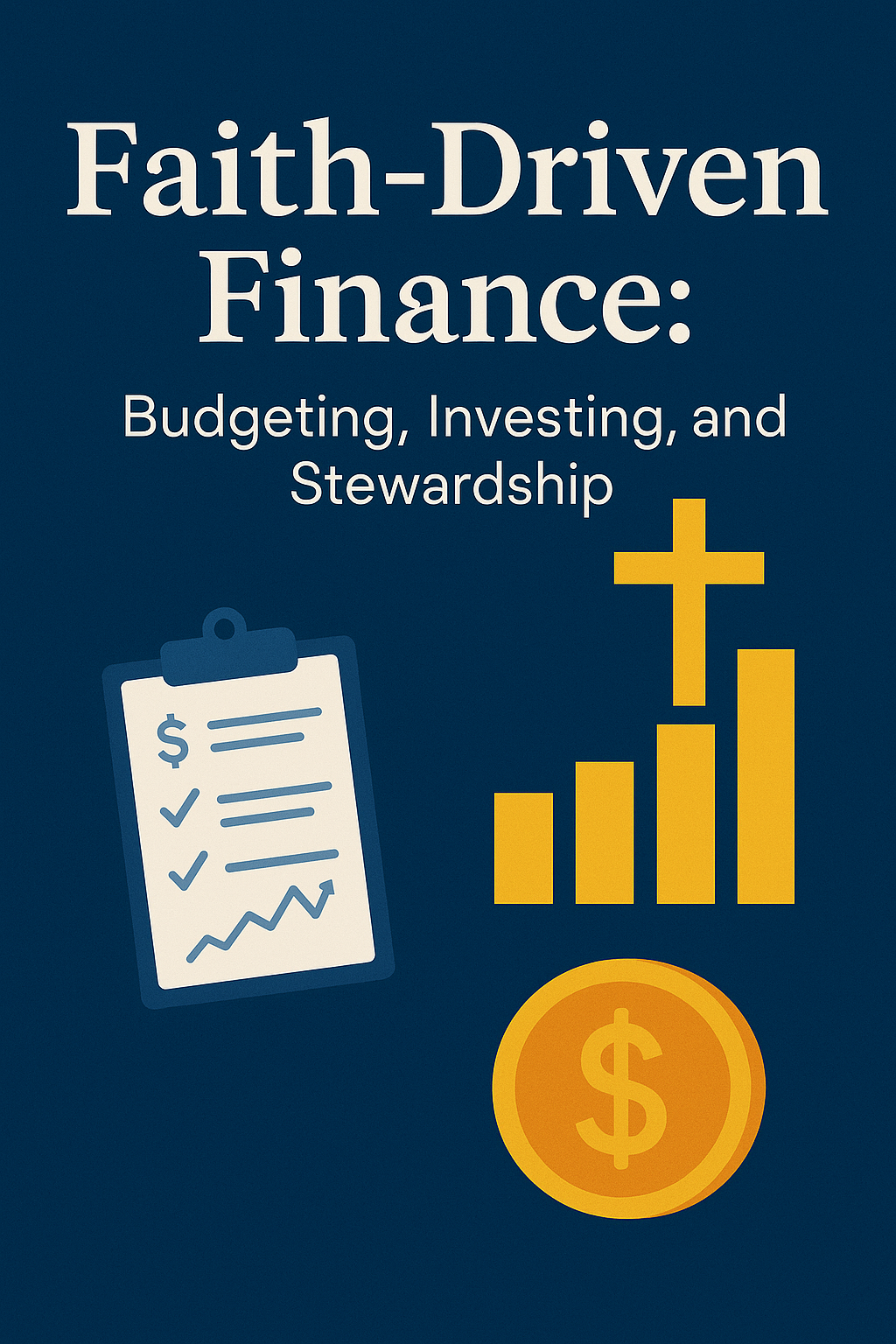
Faith-Driven Finance: Budgeting, Investing, and Stewardship
Faith-driven finance empowers Christians to budget wisely, invest ethically, and steward God’s resources with kingdom purpose and eternal impact.
Read more
7 Inspiring Ways AI & Faith: Using Tech as a Ministry Tool for Kingdom Impact
AI & faith: using tech as a ministry tool – discover how believers can harness artificial intelligence to enhance outreach, discipleship, and Gospel influence in today’s digital age. AI & Faith: Using Tech as a Ministry Tool Outline Heading Description H2: Understanding AI’s potential in ministry Define AI, explore opportunities for church and missions H2: Biblical perspectives on innovation and tools How scripture values creativity, wisdom, and tools H2: Key ministry areas enhanced by AI Content creation, virtual discipleship, analytics H2: AI-powered content and engagement Chatbots, sermon transcripts, social media content H2: Virtual discipleship & community building AI coaching, online Bible study assistants H2: Data insights: making ministry smarter Analytics for attendance, giving patterns, needs H2: Ethical considerations and faith alignment Bias, privacy, stewardship of data H2: Real examples: Global Transformation Ministry usage How GTM programs integrate AI tech in ministry H2: Overcoming concerns and building trust in technology Fear of dehumanization, theology of tools H2: Measuring impact: outcomes and feedback loops Growth in reach, engagement, conversions H2: Tools & training from Global Transformation Ministry AI in ministry workshops, resource toolkits H2: Action plan download for AI-empowered ministry Interactive ministry planning sheet H2: Frequently Asked Questions Six or more FAQs H2: Call to Action: Join GTM AI Ministry Programs Engagement prompts, next steps Understanding AI’s Potential in Ministry Artificial Intelligence (AI) isn’t just futuristic—it’s a powerful ministry tool today. From automated content support to personalized discipleship, AI can multiply outreach, streamline tasks, and free leaders for deeper pastoral care. The intersection of AI & faith offers a new avenue for Kingdom innovation. Biblical Perspectives on Innovation and Tools Scripture does not fear tools or innovation—instead, it affirms human creativity as God’s gift. In Exodus, engineers build tabernacle components. In Bezalel and Oholiab, God empowers artisans. These narratives show that when tools are aligned with God’s purposes, they serve His mission. Key Ministry Areas Enhanced by AI AI helps ministries optimize impact and extend reach without losing personal connection. AI‑Powered Content and Engagement These tools support consistent, high-quality outreach without overwhelming volunteers. Virtual Discipleship & Community Building AI assistants can be trained to support Bible study plans, prayer reminders, and spiritual coaching. Virtual small-group facilitation via AI chat reduces friction and keeps discipleship moving—even in remote or busy environments. Data Insights: Making Ministry Smarter AI-powered analytics can help ministry leaders: Such insights enable wise stewardship of resources and personal care. Ethical Considerations and Faith Alignment Using AI requires wisdom: Faithful frameworks guide ethical technology use. Real Examples: Global Transformation Ministry Usage Global Transformation Ministry has begun integrating AI tools in several programs: These tools multiply ministry reach and reduce administrative load. Overcoming Concerns and Building Trust in Technology Some worry AI will replace human care. But much like a well-built tool, AI should serve—not supplant—human connection. Leaders can build trust by emphasizing transparency, explaining AI’s role, and ensuring that pastoral follow‑up remains human-led. Measuring Impact: Outcomes and Feedback Loops Categories to track: Tools & Training from Global Transformation Ministry GTM equips churches and ministries with: Action Plan Download for AI‑Empowered Ministry Sign up to receive a FREE AI Ministry Strategy Planner, which includes: Frequently Asked Questions 1. Is AI compatible with Christian ministry?Yes—when used wisely, AI is a modern tool to amplify outreach, support discipleship, and expand service while remaining grounded in Scripture. 2. Can AI replace pastoral care?No. AI offers assistance and scalability, but genuine pastoral care and human empathy remain irreplaceable. 3. Is using AI ethical from a biblical standpoint?Yes—as long as it respects privacy, avoids bias, and serves God-honoring purposes under accountable leadership. 4. Do small churches or ministries benefit from AI?Absolutely—even basic tools like newsletter automation or chatbot phrases can extend reach and free up leaders. 5. Are there costs or risks to implementing AI?Some tools have associated costs or require tech familiarity. Ministries should budget and train carefully before deployment. 6. How do I maintain authenticity when using AI-generated content?Always review, edit, and personalize AI outputs. Let AI assist, but let human heart and discernment remain in final content. Conclusion & Call to Action AI & Faith: using tech as a ministry tool opens kingdom-minded doors of innovation, reach, and faithful service.When properly stewarded, AI multiplies impact while preserving heart-driven care. 👉 Ready to explore further? Join Global Transformation Ministry’s AI in Ministry Workshop or Digital Ministry Cohort, download the strategy planner, and begin using tech to serve timeless truths today.
Read more
6 Powerful Reasons Generosity as Business Strategy: Giving Before Gaining Drives Success
Generosity as business strategy: giving before gaining – discover how faith-led generosity builds trust, culture, and success while benefiting communities. Generosity as Business Strategy: Giving Before Gaining Outline Heading Description H2: Introduction to generosity-first business strategy Defining the approach and its biblical alignment H2: Biblical principles behind giving before gaining Scriptural foundations: Luke, Acts, Matthew H2: Benefits of generosity as a strategic practice Trust-building, loyalty, brand impact H2: How giving-first transforms workplace culture Employee motivation, teamwork, morale H2: Implementing generosity in business models Profit-sharing, community reinvestment, client gifts H2: Balancing generosity with financial sustainability ROI, budgeting, margin management H2: Real-world examples: Kingdom-minded businesses Stories tied to Global Transformation Ministry H2: Overcoming objections and maintaining discipline Preventing burnout or misuse H2: Measuring impact: metrics and feedback loops Customer lifetime value, employee retention, social impact H2: Tools & training from Global Transformation Ministry Programs for leaders and entrepreneurs H2: Step-by-step action plan download offer Encourage sign-up H2: FAQs on generosity-driven business strategy Six or more realistic questions H2: Call to Action: Join Ministry Programs Engage with cohorts and resources Introduction to Generosity‑First Business Strategy Adopting generosity-first means choosing to give value—time, resources, service—before expecting return. In business, this strategy establishes credibility and purpose. Grounded in Christian values, it views profit not as the primary aim but a byproduct of faithful service and generous leadership. Biblical Principles Behind Giving Before Gaining Key scriptures inspire the generous business approach: These scriptures affirm that generosity invites abundance through God’s providence. Benefits of Generosity as a Strategic Practice Generosity sends a message: You serve people, not just profit. How Giving‑First Transforms Workplace Culture Internally, generosity fosters: Implementing Generosity in Business Models Ways to operationalize generosity: Balancing Generosity with Financial Sustainability Strong generosity strategies require discipline: Real‑World Examples: Kingdom‑Minded Businesses Several entrepreneurs connected to Global Transformation Ministry integrate generosity in their model: Overcoming Objections and Maintaining Discipline Concerns may include: Measuring Impact: Metrics and Feedback Loops Track through: Tools & Training from Global Transformation Ministry Global Transformation Ministry offers: Step‑by‑Step Action Plan Download Offer Sign up today to receive a FREE Generosity Strategy Planner—including: Frequently Asked Questions 1. Can businesses really give before gaining?Yes! Many Kingdom-minded companies start by offering free insights or pilot services—gains come through trust and long-term partnership. 2. What percentage of revenue should go toward generosity?There’s no one-size-fits-all rule—many start with 5–10% and adjust as impact and financial stability allow. 3. How can smaller businesses adopt giving-first models?Even small free gestures—resource guides, mentoring, local volunteering—signal commitment and build credibility. 4. Could this approach harm profitability?Only if mismanaged. With proper planning and measuring, generosity strengthens relationships and long-term sustainability. 5. Is giving meant for specific industries?No—it applies across sectors: hospitality, tech, services, retail—anywhere a company can serve beyond the transaction. 6. How do I start if I’m not in leadership?Begin in your scope: propose a team-level gift, mentor someone, or donate part of your sales commissions. Conclusion & Call to Action Generosity as business strategy is far more than a feel-good tactic—it’s Kingdom-led wisdom with transformative power in enterprise. Giving before gaining positions your business for relational depth, cultural strength, and enduring impact. 👉 Join Global Transformation Ministry’s Generosity Cohort or Business Strategy Workshops today to begin implementing this faith-fueled approach. Download your planner and empower your business to give as God gives.
Read more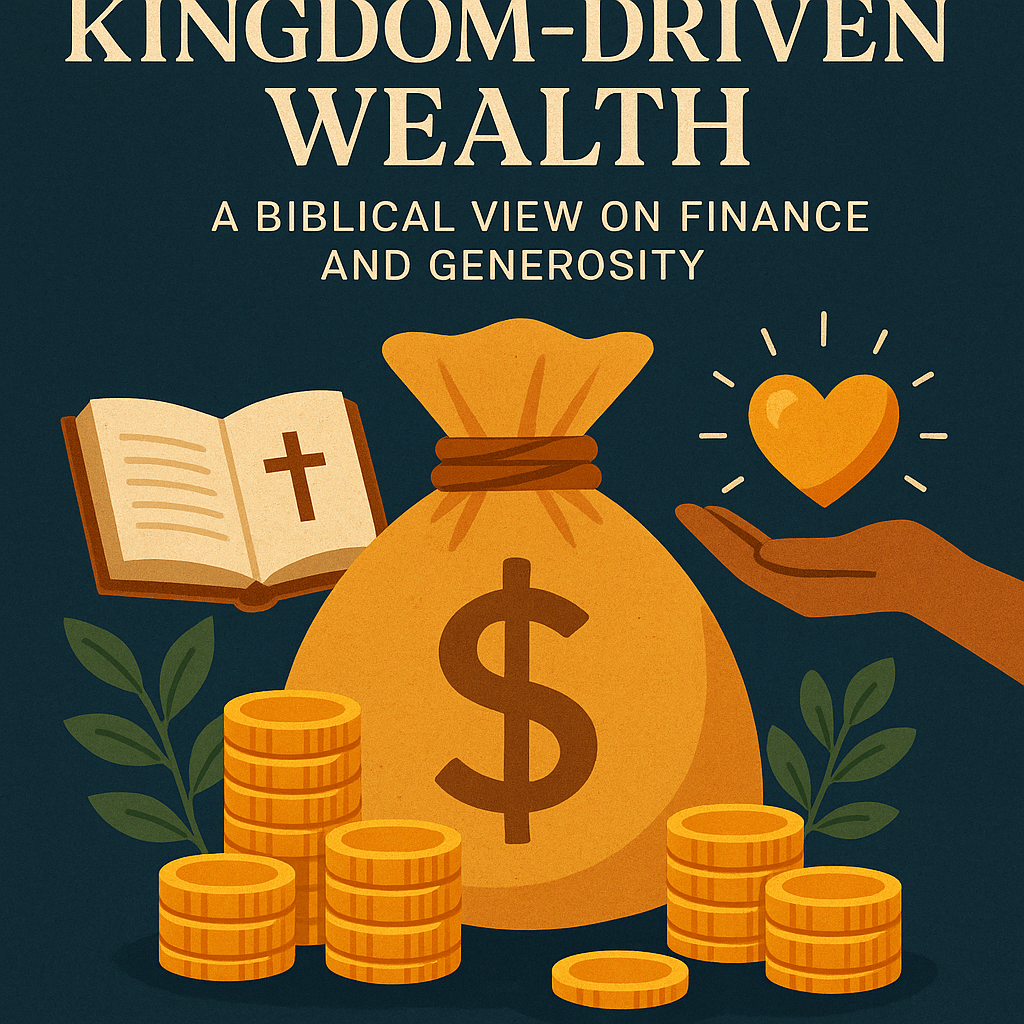
7 Kingdom‑Driven Wealth Principles: Biblical Finance and Generosity That Impact Communities
7 Kingdom‑Driven Wealth Principles: Biblical Finance and Generosity That Impact CommunitiesMeta Description: Kingdom‑Driven Wealth: a biblical view on finance and generosity – explore how scriptural stewardship and giving transform life, business, and community impact. Kingdom‑Driven Wealth: a biblical view on finance and generosity Outline Heading Description H2: Understanding Kingdom‑Driven Wealth Biblical worldview of prosperity and purpose H2: The biblical foundations for finance and generosity Scriptural references: Proverbs, Malachi, Luke, 2 Corinthians H2: Stewardship: managing resources God’s way Principles of trust, planning, and accountability H2: Generosity: heart, habits, and impact Tithing, offering, sacrificial giving H2: Balancing prosperity and humility Avoiding pride, materialism, and greed H2: Practical frameworks for biblical financial habits Budgeting, saving, debt management, investing H2: Kingdom wealth in business and entrepreneurship Social enterprise, ethical profits, reinvestment H2: Generosity as a lifestyle and community force Outreach, mercy funds, impact donations H2: Case studies: Global Transformation Ministry impact stories Real-life outcomes of faith-based giving H2: Overcoming financial fears and spiritual blocks Anxiety, entitlement, scarcity mindsets H2: Measuring impact: spiritual and social ROI Community testimonials, kingdom metrics H2: Tools & support from Global Transformation Ministry Financial discipleship workshops, giving guides, mentorship H2: Monthly action planner for biblical wealth and giving Downloadable scriptural budgeting sheet H2: Frequently Asked Questions Six or more FAQs H2: Call to Action: Engage with Ministry Opportunities Join cohorts, download resources, become a transformational giver Understanding Kingdom‑Driven Wealth Kingdom‑Driven Wealth isn’t just about income—it’s about aligning your financial life with God’s purposes. Biblical generosity, stewardship, and faithful management turn resources into tools for eternal impact. Rather than chasing worldly prosperity, believers pursue wealth with meaning—fueling missions, caring for the vulnerable, and honoring God with every dollar. The Biblical Foundations for Finance and Generosity Scripture offers numerous guiding passages: These form the ethical foundation of Kingdom financial practice. Stewardship: Managing Resources God’s Way Biblical stewardship includes budgeting, saving, transparency, and accountability. It means: Generosity: Heart, Habits, and Impact Generosity flows from faith—but it’s also a habit: When generosity becomes lifestyle—benevolence flows, compassion grows, and communities change. Balancing Prosperity and Humility Wealth carries risk—pride, complacency, and temptation. Scripture offers warnings: Practical Frameworks for Biblical Financial Habits Kingdom Wealth in Business and Entrepreneurship Kingdom-driven businesses operate on values: Generosity as a Lifestyle and Community Force Generous believers contribute beyond church envelopes: Case Studies: Global Transformation Ministry Impact Stories Shared testimonies highlight: Overcoming Financial Fears and Spiritual Blocks Common barriers: Measuring Impact: Spiritual and Social ROI Track impact through: Tools & Support from Global Transformation Ministry Global Transformation Ministry equips believers with: Monthly Action Planner for Biblical Wealth and Giving Sign-up to receive a FREE Monthly Action Planner—complete with: Frequently Asked Questions 1. What is Kingdom‑Driven Wealth?It’s the biblical approach to using financial resources to honor God, serve others, and steward what He entrusts. 2. How much should I give?Start with tithing if comfortable; then consider giving offerings, mercy funds, or sacrificial giving as led by faith. 3. Is investing aligned with biblical generosity?Yes, when done with integrity, purpose, and thinking of long-term stewardship—not greed. 4. What if I’m in debt?Begin by budgeting, reducing unnecessary expenses, and pay down high-interest debt. Generosity can still exist in sacrifice. 5. How can businesses practice Kingdom‑Driven Wealth?By operating ethically, compensating fairly, giving a portion of profits back to mission, and mentoring new entrepreneurs. 6. Will generosity affect my financial stability?When generosity is balanced with budgeting, saving, and wise stewardship, it enhances long-term peace and stability. Conclusion & Call to Action Kingdom‑Driven Wealth reshapes how we handle money—turning profit into purpose. When biblical stewardship and generosity guide finances, lives and communities flourish. 👉 Ready to take the next step? Join Global Transformation Ministry’s Financial Discipleship Training or Generosity Cohort—download your action planner and start stewarding Kingdom wealth today.
Read more
5 Inspiring Ways the Christian Work Ethic Fuels Business Growth & Integrity
The Christian Work Ethic: Faith that fuels business – discover how biblical principles drive productivity, trust, and transformative leadership in the workplace. The Christian Work Ethic: Faith that Fuels Business Outline Heading Description H2: Understanding the Christian work ethic Origins, biblical foundations, relevance today H2: Core principles of Christian work ethic Diligence, stewardship, integrity, service H2: Biblical examples and scriptural backing Joseph, Daniel, Proverbs H2: How faith fuels productivity and excellence Motivation, skill, accountability H2: Integrity as a business advantage Trust, reputation, relationships H2: Stewardship: responsible resource management Time, talent, finances H2: Servanthood: leadership through service Team cohesion, empowerment H2: Practical strategies for believers at work Planning, prayer, purpose-driven tasks H2: Culture transformation through values alignment Shift from profit‑only thinking H3: Case study: Global Transformation Ministry businesses Real stories of transformation H2: Overcoming challenges and objections Burnout, secular norms, diversity H2: Measuring impact: metrics & testimonials Morale, retention, ethical audits H2: Tools & support from Global Transformation Ministry Training, workshops, resource downloads H2: One‑page monthly action plan download Step-by-step integration guide H2: FAQs on the Christian work ethic in business Six+ realistic questions H2: Call to action: join Global Transformation Ministry programs Invitations, next steps Understanding the Christian Work Ethic The Christian work ethic is rooted in scriptural teachings like Colossians 3:23 (“Whatever you do, work at it with all your heart”) and Proverbs 22:29 (“Do you see a man skilled in his work? He will serve before kings”). These passages underscore that faith-driven work isn’t merely duty—it’s worship. For businesses today, integrating this ethic fosters purpose, excellence, and a higher calling. Core Principles of Christian Work Ethic These values create environments where performance meets purpose. Biblical Examples and Scriptural Backing Their life stories illustrate how faith strengthens ambition with virtue. How Faith Fuels Productivity and Excellence Faith provides deep motivation. When you see work as service to God and people, tasks become meaningful. That significance drives higher focus, creativity, and resilience—even under pressure. Teams shaped by the Christian work ethic often enjoy better alignment, lower conflict, and consistent execution. Integrity as a Business Advantage Trust is currency in business. Honesty builds relationships, protects reputation, and supports sustainable growth. A company where wages are fair, contracts are honored, and errors are acknowledged becomes a magnet for loyal partners and employees. Stewardship: Responsible Resource Management Stewardship isn’t just budgeting—it’s valuing people, stewarding talent development, and managing time thoughtfully. Christian leaders see employees and assets as entrusted gifts, not mere numbers. Servanthood: Leadership Through Service A Christian work ethic flips the leadership model: instead of top-down power, leaders serve their teams—listening, empowering, and supporting. This encourages creativity, ownership, and retention. Practical Strategies for Believers at Work Culture Transformation Through Values Alignment When individuals embody Christian values consistently, group norms gradually shift. Companies can evolve from profit-first models to relational, purpose-first cultures, where long-term trust outweighs quick gains. Case Study: Global Transformation Ministry Businesses A network of entrepreneurs trained in the Ministry’s leadership cohorts experienced measurable cultural shifts—improved morale, fewer conflicts, stronger customer satisfaction. Many reported increased referrals and client loyalty when values became visible in daily operations. Overcoming Challenges and Objections Measuring Impact: Metrics & Testimonials You can track: Tools & Support from Global Transformation Ministry Global Transformation Ministry offers: One‑Page Monthly Action Plan Download Sign up to receive a free, printable Monthly Action Plan—a structured guide to integrating faith, setting goals, tracking progress, and reflecting at month’s end. Frequently Asked Questions 1. What is the Christian work ethic?It’s a biblical mindset—working wholeheartedly, managing resources wisely, serving others, and acting with integrity. 2. Can this ethic benefit a secular workplace?Absolutely—principles like diligence, honesty, and service resonate widely and improve productivity and trust. 3. Is there a risk of legal or workplace conflict?Only if you force beliefs on others. Stick to modeling character; keep all initiatives voluntary and inclusive. 4. How can small business owners apply this ethic?Begin with fair treatment of employees, clarity of mission, and service-minded policies—even in small daily choices. 5. Will practicing this ethic affect profitability?Yes, in a positive way. Trust wins clients; motivated teams deliver better results over time. 6. How do I start if I’m not in leadership?Lead wherever you are: show up with integrity, offer service, seek growth, and pass encouragement. Conclusion & Call to Action The Christian work ethic is more than a moral guideline—it’s a transformative business strategy. When faith fuels work, companies thrive with integrity, purpose, and people who feel valued. 👉 Ready to grow a faith‑driven workplace? Explore Global Transformation Ministry’s Leadership & Workplace Discipleship Programs—join training, download resources, and prepare to lead by values that endure.
Read more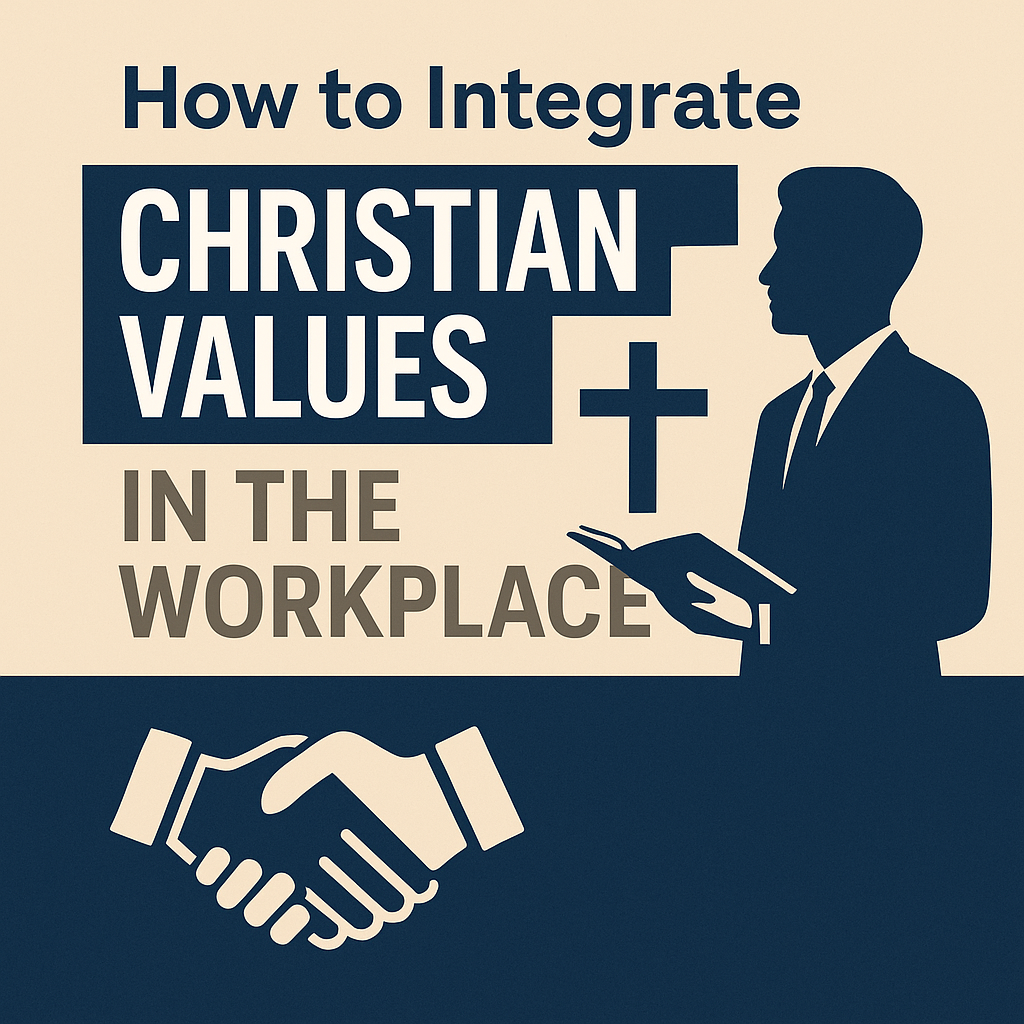
7 Powerful Ways to Integrate Christian Values in the Workplace and Transform Culture
Add Your Heading Text Here Introduction Christian values are a guiding light that can transform workplace culture—bringing integrity, compassion, and purpose. In this article, you’ll discover ways to weave faith into everyday work life while remaining professional and effective. Outline Heading Description H2: 1. Define core Christian values in context Clarify honesty, humility, love, stewardship H2: 2. Lead by example with integrity Show reliability, accountability H2: 3. Communicate compassion in interactions Be empathetic with colleagues H2: 4. Serve others through workplace ministry Volunteer, mentorship initiatives H2: 5. Uphold fairness and justice Equity, non‑discrimination H2: 6. Practice ethical decision‑making Avoid shortcuts, conflicts of interest H2: 7. Encourage spiritual growth and support Prayer groups, worship breaks H3: Benefits of integrating Christian values Community building, increased trust H3: Overcoming challenges Secular environment, diversity concerns H3: Measuring impact Surveys, feedback loops H2: Real‑life case studies Stories from Global Transformation Ministry programs H2: Practical action plan Step‑by‑step implementation H2: Common pitfalls to avoid Legal, HR considerations H2: Tools & resources Bible devotionals, small group guides H3: External links to Christian workplace management resources For deeper reading H2: FAQs Six or more with strong answers H2: Conclusion & call to action Invite Global Transformation Ministry resources Define core Christian values in context Christian values like honesty, humility, love, and service provide an ethical compass in business settings. To integrate them at work, first clarify what these values mean in your specific role. For instance: Honesty: giving credit where due and being transparent in reporting. Stewardship: managing resources—time, money, talent—responsibly. By reframing these values in workplace language (e.g., “ethical stewardship” instead of moralizing), you make them more relatable and approachable. 2. Lead by example with integrity Employees and colleagues notice leaders who consistently do the right thing. Practicing accountability, admitting mistakes, and being reliable builds a culture of trust. When you model integrity, you encourage coworkers to rise to a higher standard too. Communicate compassion in interactions Christian values call us to love our neighbor. In the workplace, that means showing empathy and listening actively. If someone is struggling, offer understanding rather than judgment. Try small acts—sending an encouraging note, sharing a coffee, or being a shoulder to lean on. Serve others through workplace ministry Offer your skills and time where needed. Whether it’s mentoring a junior team member or organizing a volunteer event, serving others reflects Christ’s example. Consider inviting coworkers to join in community outreach—when done sensitively and inclusively, these initiatives foster camaraderie and deeper meaning. Uphold fairness and justice Stand against discrimination and bias in all forms. Christian values call us to justice—ensuring equal treatment, advocating for inclusive policies, and promoting diversity in teams. Fair hiring and evaluation practices are non-negotiable expressions of this commitment. Practice ethical decision‑making Every decision comes with ethical implications—money handling, marketing claims, contracts. Avoid conflict of interests, deceptive shortcuts, or pressure tactics. Take time to pray or reflect before tough calls. Seek counsel when uncertain. Encourage spiritual growth and support If permitted, form or join an intercompany prayer group or small devotion circle. Provide the space for prayer or quiet reflection during breaks. Some organizations allow “faith rooms”—use them as inclusive places of peace and connection. These support structures reinforce your values in daily routines. Benefits of integrating Christian values Embedding faith-based ethics at work builds: Trust and loyalty: coworkers see you as reliable and principled. Community: deeper encouraging relationships. Fulfillment: aligning your vocation with your faith gives your work meaning. Overcoming challenges Secular workplaces: avoid preaching; focus on universal virtues such as honesty. Diversity and inclusion concerns: remain respectful and optional—never force beliefs. Legal or HR boundaries: know policies around faith expression in your company. Work within limits. Measuring impact Track engagement through feedback surveys, team morale assessments, and anecdotal stories. Notice improvements in collaboration, trust, and employee wellbeing. Use small metrics like volunteer hours or attendance at devotion groups. Real‑life case studies Global Transformation Ministry programs highlight managers who introduced servant leadership initiatives—like weekly check-ins, peer mentorship, and ethical training. Teams reported fewer conflicts, stronger unity, and improved productivity when Christian values were consistently practiced. Practical action plan Assess current gaps—find areas where values are missing. Articulate workplace value statements tied to Christian principles. Pilot a small initiative—e.g. monthly lunchtime reflection or mentoring hour. Invite inclusively in an opt‑in format. Evaluate and iterate—get feedback, refine format. Scale as appropriate—work across teams or departments. Common pitfalls to avoid Assuming everyone shares your beliefs. Forcing participation. Overstepping HR policies. Imposing theology rather than focusing on character and behavior. Tools & resources Devotion guides like Every Good Endeavor by Tim Keller for work-related Christian ethics. Bible study plans focused on leadership and service. Resources from workplace faith networks such as the Christian Employers Alliance (external link). FAQs Can I share Christian values without promoting religion?Yes—you can highlight universal virtues like honesty, service, and respect. Share faith-based motivations only when invited or in personal contexts. Is it legal to pray or lead a prayer group at work?In most cases, voluntary prayer groups are permitted if not disruptive or mandatory. Check company policies and choose inclusive spaces. What if coworkers feel uncomfortable?Always offer participation as optional. Respect boundaries. Focus on service and relationship, not persuasion. How do I handle conflicts between company policy and Christian ethics?Raise concerns respectfully, explain your ethical perspective, and seek a dialogue. If necessary, consider anonymous feedback channels. How do I begin introducing these values if I’m not a manager?Influence from any level is powerful. Start small: act with integrity, serve others, mentor peers. Your behavior often speaks louder than official titles. Will practicing Christian values help with productivity?Yes—teams with trust, mutual respect, and servant‑leadership tend to be more motivated, cohesive, and efficient. Conclusion & Call to Action Integrating Christian values in the workplace isn’t about preaching—it’s about living faith through integrity, compassion, and service. Global Transformation Ministry offers tools, training sessions, and workplace guidance to help believers lead ethically and build positive workplace culture. 👉 Ready to take the next step? Visit the Global Transformation Ministry’s
Read more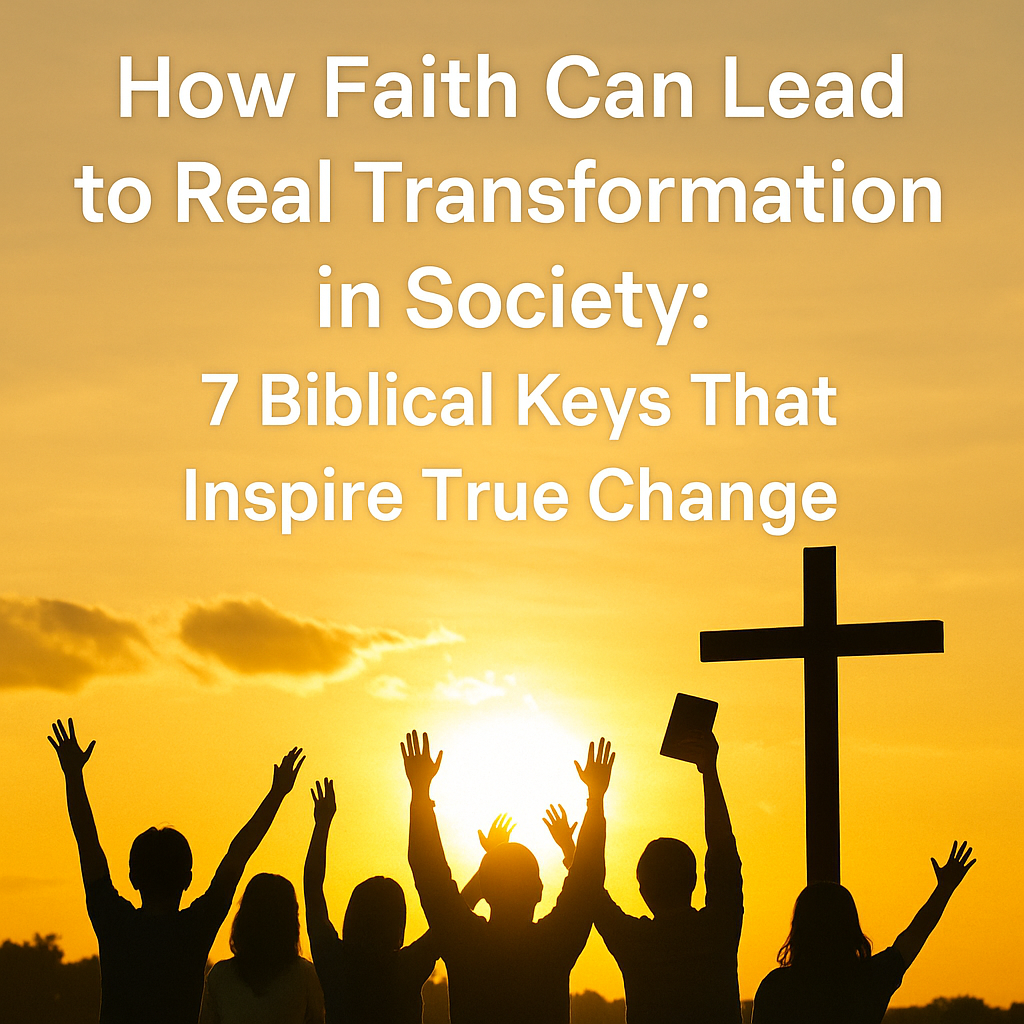
How Faith Can Lead to Real Transformation in Society: 7 Biblical Keys That Inspire True Change
How Faith Can Lead to Real Transformation in Society: 7 Biblical Keys That Inspire True Change Meta Description: How Faith Can Lead to Real Transformation in Society—Explore 7 powerful biblical principles that can reshape communities and bring lasting change through faith-driven action. Introduction Defining Faith in a Societal Context Faith, in its simplest form, is trust in the unseen. But when viewed through a biblical lens, it becomes a powerful agent of transformation. Hebrews 11:1 defines faith as “the substance of things hoped for, the evidence of things not seen.” Society, burdened with injustice, poverty, and disconnection, is in desperate need of what true faith can bring—hope, love, and restoration. Why Transformation Matters Today Transformation isn’t just about moral reform; it’s about renewal at every level—individual, community, and global. As crises intensify globally, from economic instability to cultural confusion, people are searching for a compass. Faith offers that guiding light, pointing societies toward righteousness, justice, and healing. The Biblical Foundation of Societal Transformation Faith in the Old Testament: Catalysts for Change Abraham’s obedience, Moses’ leadership, and the courage of Esther illustrate how faith consistently led individuals to influence and transform entire nations. Each acted not for personal gain but to fulfill God’s purposes in their time. Jesus and the Kingdom Message: A Transformative Paradigm Jesus didn’t come to start a religion—He announced a kingdom. His teachings in Matthew 5–7 (the Sermon on the Mount) flipped societal norms, calling people to love enemies, pursue justice, and walk in humility. His faith-fueled life brought healing, unity, and truth. How Personal Faith Inspires Public Good From Inner Renewal to Outer Action Transformation begins in the heart. Romans 12:2 urges believers not to conform but to be transformed by renewing their minds. This internal change naturally spills over into public life—leading to acts of kindness, justice, and reform. Testimonies of Faith-Led Societal Reform History is replete with individuals whose personal faith birthed societal impact—Martin Luther King Jr., William Wilberforce, and Mother Teresa to name a few. Their faith didn’t remain private—it ignited movements. Faith and Justice: Building Fairer Systems Micah 6:8 and the Call to Justice “He has shown you, O man, what is good… to act justly, love mercy, and walk humbly.” This verse has been the rallying cry for Christians engaged in justice reform. Faith compels us to advocate for the oppressed and confront unjust systems. Faith Communities Advocating Legal and Social Reform From anti-human trafficking campaigns to prison ministries, faith communities are on the front lines. Organizations like International Justice Mission (IJM) work globally, applying biblical justice to real-world legal systems. The Role of the Church in Societal Transformation The Early Church Model (Acts 2 & 4) The early believers shared everything in common, cared for the poor, and gained favor with all people. Their communal lifestyle wasn’t just spiritual—it was practical and impactful. Modern Day Ecclesia: A Force for Change Today’s churches are called to be more than worship centers—they must be community hubs, advocacy platforms, and centers of healing. Transformation starts in the pews and ripples into the streets. Faith as a Catalyst for Community Building Hebrews 10:24-25 and Collective Action “Let us consider how to spur one another on toward love and good deeds…” Community-building is central to faith. It creates spaces of accountability, encouragement, and shared mission. Faith-Based Community Development Programs Many churches now run initiatives addressing homelessness, job training, literacy, and addiction recovery—demonstrating faith’s power to mend broken social fabric. Economic Empowerment Through Faith Principles Stewardship and Generosity (2 Corinthians 9) Faith teaches that everything belongs to God. Generosity, therefore, becomes a lifestyle. Faith-driven giving fuels microfinance, business incubators, and relief efforts globally. Biblical Entrepreneurship and Kingdom Economics Christian entrepreneurs are redefining success—measuring it not just in profit, but in impact. Kingdom economics prioritizes people over profits and sustainability over short-term gain. Education and Faith: Transforming Minds and Hearts Proverbs 22:6: The Power of Godly Teaching “Train up a child in the way he should go…” Education is a spiritual act. Faith-based schools integrate biblical values with academic excellence, shaping future leaders. The Role of Christian Schools and Colleges Institutions like Wheaton College and Biola University train students to think biblically and act justly—preparing them to be salt and light in every sector of society. Faith and Health: Healing Societies Spiritually and Physically James 5:15 and Holistic Healing Faith is not just spiritual—it touches physical and emotional health. Churches offer prayer, counseling, and wellness programs, especially in underserved communities. The Role of Churches in Mental Health and Wellness Many faith communities now offer mental health support, workshops, and partnerships with therapists—destigmatizing emotional struggles and offering holistic care. Faith in Politics: Navigating Influence without Compromise Daniel and Joseph: Models of Godly Governance These biblical figures navigated corrupt systems with integrity. They show how faith can thrive in politics without losing moral footing. Christians in Political Office Today Faith-led leaders are impacting policy on issues like poverty, education, and human rights, proving that godly governance is both possible and powerful. Faith and Environmental Stewardship Genesis 2:15 and Creation Care God’s first command was to “work and keep” the earth. Faith motivates believers to steward creation—not exploit it. Environmental activism can be an act of worship. Faith-Based Responses to Climate Change From planting trees to clean energy initiatives, churches are leading local efforts to combat climate change and teach environmental responsibility. Faith in Crisis: Transforming Tragedy into Testimony Romans 8:28 in Action Tragedy often tests faith, but it can also reveal its power. Believers around the world have turned personal loss into ministries of comfort, healing, and hope. Stories of Post-Disaster Faith Responses Whether it’s post-hurricane relief in the U.S. or earthquake recovery in Haiti, faith groups consistently show up early and stay late—embodying Christ’s compassion. Global Movements Fueled by Faith The Abolition of Slavery and William Wilberforce Wilberforce’s faith drove him to end the British slave trade. His story proves that persistent, prayerful action can change the course of history. Modern Faith Movements for Justice Today’s equivalent includes
Read more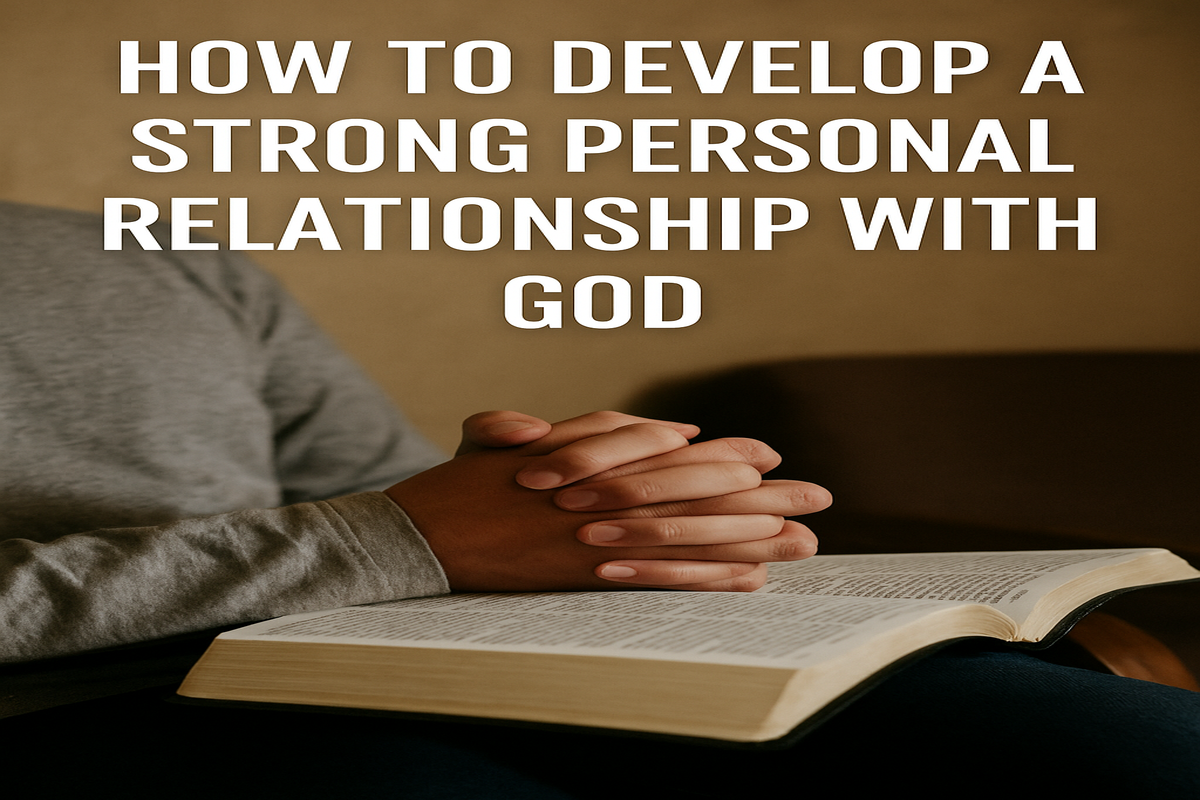
How to Develop a Strong Personal Relationship with God: 10 Proven Ways to Deepen Your Faith
How to Develop a Strong Personal Relationship with God: 10 Proven Ways to Deepen Your Faith Understanding the Concept of a Personal Relationship with God What Does It Mean to Know God Personally? To have a personal relationship with God means more than simply believing in His existence. It’s about intimacy, communication, and trust—knowing God like you would know a close friend, parent, or mentor. It involves both hearing from Him and speaking to Him, recognizing His presence, and living under His guidance daily. As James 4:8 says, “Draw near to God, and He will draw near to you.” The relationship is reciprocal—God desires to be close to us, but we must seek Him earnestly. Biblical Basis for Personal Relationship with God From Genesis to Revelation, the Bible showcases God’s desire for a relationship with humanity. Adam and Eve walked with God, Moses spoke with Him face-to-face (Exodus 33:11), and David was called a man after God’s heart (1 Samuel 13:14). In the New Testament, Jesus bridges the gap, inviting all believers into an intimate, eternal relationship with God through faith (John 15:15). The Importance of Intimacy with God Why Spiritual Connection Matters A personal relationship with God transforms religion into relationship. It deepens your understanding of your purpose and equips you to navigate life’s trials with divine guidance. Jesus stated in John 17:3, “Now this is eternal life: that they know You, the only true God, and Jesus Christ, whom You have sent.” Benefits of a Strong Relationship with God Practical Steps to Strengthen Your Relationship with God Start with Daily Prayer and Communication Prayer is a conversation with God. It’s not about fancy words but authentic, heartfelt dialogue. Set aside time every day to speak with Him, thank Him, ask for guidance, and just listen. How to Pray Consistently and Authentically Study the Bible Intentionally God speaks through His Word. Studying the Bible fuels your spirit and reveals God’s character, promises, and will. Tips for Deep and Reflective Bible Study Worship as a Lifestyle Worship isn’t just music—it’s living a life that pleases God. Romans 12:1 calls us to offer our bodies as a living sacrifice, “holy and pleasing to God—this is your true and proper worship.” Embrace Repentance and Forgiveness Daily confession keeps your heart clean and open. God is faithful to forgive and restore (1 John 1:9). Let go of guilt and accept His grace. Building Faith Through Obedience Living Out God’s Word Jesus said, “If you love Me, keep My commandments” (John 14:15). Obedience isn’t about legalism but trust—believing that God’s ways are better. Trusting God in Times of Trials Your relationship with God will be tested during hard times. Hold onto scriptures like Romans 8:28, believing that “in all things God works for the good of those who love Him.” The Role of the Holy Spirit Understanding the Holy Spirit’s Presence The Holy Spirit is your helper, comforter, and guide (John 14:26). He enables you to live righteously, convicts you of sin, and teaches you all truth. How to Be Led by the Spirit Surround Yourself with a Faith Community Importance of Fellowship and Accountability Hebrews 10:25 encourages believers not to neglect meeting together. Fellowship builds spiritual stamina and keeps you rooted in truth. Getting Involved in Church Activities Serving in a local church strengthens your gifts and gives you purpose. Whether it’s teaching, hospitality, or tech, every role matters in God’s Kingdom. Guarding Your Heart and Mind Spiritual Disciplines for Protection Avoiding Spiritual Drift Neglecting your spiritual life leads to distance from God. Regular check-ins, spiritual disciplines, and community will keep you anchored. Measuring Growth in Your Relationship with God Signs of Spiritual Maturity Keeping a Spiritual Journal Tracking prayers, answered requests, and revelations from God keeps your journey visible and encourages continual growth. Common Challenges and How to Overcome Them Dealing with Doubt and Dry Seasons Even great men of faith doubted (John the Baptist, Elijah). Take doubts to God in prayer and keep feeding your faith through the Word and community. Finding Motivation and Staying Committed Discipline trumps motivation. Set small goals, celebrate wins, and keep showing up even when it feels dry—God honors consistency. Frequently Asked Questions (FAQs) 1. Can I have a personal relationship with God if I’ve sinned greatly?Absolutely. God’s grace is greater than any sin. He forgives all who repent sincerely (Isaiah 1:18). 2. How do I know God is speaking to me?He speaks through the Bible, inner peace, circumstances, and wise counsel. His voice aligns with Scripture and brings peace, not confusion. 3. How often should I pray to build a relationship with God?Daily, even multiple times a day. Prayer is ongoing conversation, not a one-time event. 4. Can I have a relationship with God without going to church?Yes, but church community strengthens your walk. God designed us for fellowship, growth, and mutual encouragement. 5. What do I do when I don’t feel God’s presence?Keep seeking Him. Feelings aren’t facts. Trust His promise: “I will never leave you nor forsake you.” (Hebrews 13:5) 6. What’s the best Bible version for building a personal relationship with God?Try the New Living Translation (NLT) or English Standard Version (ESV) for accessible, accurate reading. Conclusion and Final Encouragement Developing a strong personal relationship with God is the most rewarding journey you’ll ever take. It requires consistency, humility, and a heart open to transformation. Whether you’re just starting out or deepening your faith walk, know this: God wants to walk closely with you. 🙏 Ready to grow? Start with 15 minutes of prayer today. Join a Bible study. Download a devotional app. Or simply say, “God, I want to know You more.”
Read more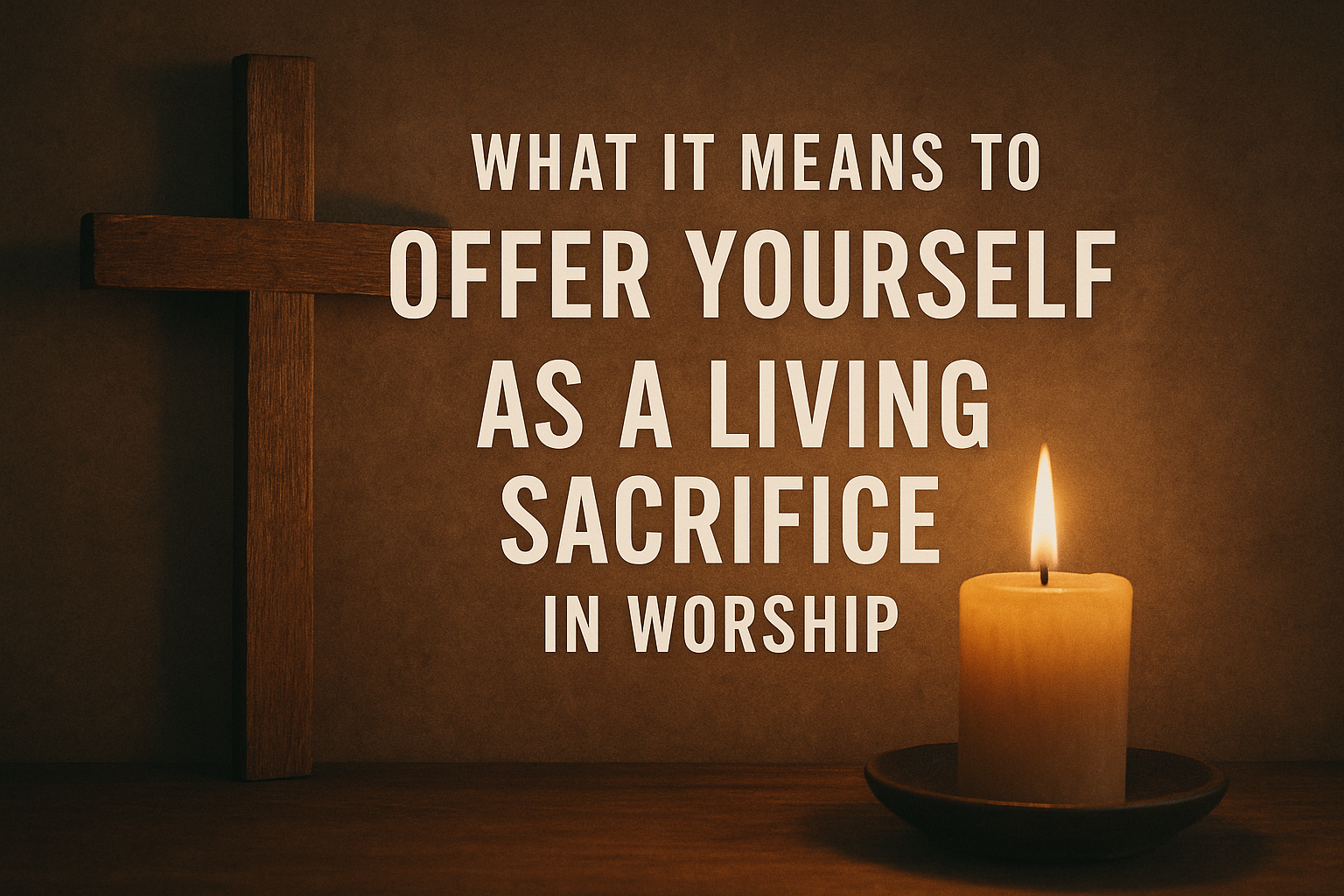
What It Means to Offer Yourself as a Living Sacrifice in Worship
What It Means to Offer Yourself as a Living Sacrifice in Worship Understanding the Concept of a Living Sacrifice The phrase “living sacrifice” comes directly from Romans 12:1, where the Apostle Paul exhorts believers to present their bodies as a “living sacrifice, holy and acceptable to God, which is your reasonable service.” At first glance, this idea seems paradoxical—how can a sacrifice be both alive and offered? In Scripture, sacrifices were often bloody, final, and dead. Yet here, Paul calls believers to offer themselves in an ongoing, daily, vibrant devotion to God. This call isn’t about temporary moments of praise—it’s about entire lives laid on the altar. It’s not merely singing songs on a Sunday; it’s the transformation of everyday life into an act of worship. The Old Testament Background of Sacrifice In the Old Covenant, God established a system of offerings involving animals (see Leviticus 1–7). These were acts of atonement and devotion, symbolizing the surrender of life and acknowledging God’s holiness. However, they were limited, external, and repeated often. Transitioning from Dead to Living Sacrifice Jesus Christ became the ultimate and final sacrifice (Hebrews 10:10), fulfilling what the animal sacrifices pointed toward. In response, Christians no longer need to offer animals, but are instead called to offer themselves. A “living sacrifice” means that every breath, action, and intention is surrendered to God—not through death, but through a life wholly devoted to Him. Romans 12:1 in Context Let’s pause and read the verse in full: “I appeal to you therefore, brothers, by the mercies of God, to present your bodies as a living sacrifice, holy and acceptable to God, which is your spiritual worship.” — Romans 12:1 (ESV) The Mercies of God as the Motivation Paul begins with “therefore,” connecting the verse to Romans 1–11, where he outlines God’s incredible mercy in salvation. Our reasonable response to grace is worship—not just emotional, but rational, deliberate commitment to God. Reasonable Service: Spiritual Worship Explained The phrase “reasonable service” (or “spiritual worship” depending on the translation) underscores that offering oneself is not extreme—it’s logical. After receiving unmerited favor, the most fitting response is full surrender. What It Practically Means to Offer Yourself Surrendering Your Body, Mind, and Spirit God wants more than church attendance. He desires your time, talents, thoughts, relationships, and daily decisions. Sacrificial worship means aligning every aspect of life with His will. Dying to Self Daily Jesus said, “If anyone would come after me, let him deny himself and take up his cross daily and follow me” (Luke 9:23). Self-denial doesn’t mean self-hatred—it means rejecting selfish desires and choosing God’s path. Living Holy and Pleasing to God Holiness isn’t perfection—it’s dedication. A holy life is set apart from sin and aligned with God’s standards. When we live like this, our lives become pleasing offerings to God. Worship Beyond the Church Walls Worship in the Workplace, Family, and Society Worship is not confined to a sanctuary. It’s in how we treat coworkers, love our spouses, raise our children, and serve our communities. Every interaction is an altar moment. The Role of Integrity and Service Living sacrifices are known by their fruits. When we walk in honesty, humility, and kindness, our actions become acts of worship. Serving others is one of the purest forms of worship (James 1:27). Challenges in Living as a Sacrifice Fighting Conformity to the World Romans 12:2 follows up with, “Do not be conformed to this world…” The world pushes selfishness, but God calls us to selflessness. This battle is spiritual and daily. Renewing the Mind Daily Transformation comes from mind renewal through Scripture, prayer, and Spirit-led reflection. As we change our thinking, our actions align with God’s heart. The Power and Impact of Sacrificial Worship Influence on Others and Kingdom Advancement When believers live sacrificially, others notice. It becomes a testimony that draws people to Christ. One life offered can change many lives eternally. Bringing Glory to God Ultimately, worship isn’t about us—it’s about God. Sacrificial living glorifies Him more than any song or sermon ever could. Global Transformation Ministry’s Call to Action Join the Movement of Living Worshippers At Global Transformation Ministry, we’re not just calling people to worship on Sundays—we’re raising an army of living sacrifices daily offering themselves to God. Are you ready to join this move of God? Partner with GTM for Global Impact You can volunteer, donate, intercede, or mobilize others to spread this message. Visit joingtmmd.org and step into your divine purpose today. Frequently Asked Questions Q1: What does being a “living sacrifice” mean for my job or career?A: It means doing your work with excellence, honesty, and a servant heart, seeing your workplace as a mission field. Q2: Can I be a living sacrifice and still enjoy life?A: Yes! Living for God brings joy, peace, and fulfillment far greater than anything the world offers. Q3: How do I start offering myself to God?A: Begin with a simple prayer of surrender and start aligning daily choices with biblical values. Q4: Is worship limited to music and singing?A: No. Worship includes every act done in obedience and love toward God. Q5: What if I fail to live sacrificially sometimes?A: God’s grace covers your shortcomings. Repent, reset, and continue the journey. Q6: How can I teach my family to live this way?A: Lead by example. Let them see your devotion and include them in prayer and service. Conclusion: Living Sacrifices, Living Testimonies The call to be a living sacrifice is both radical and reasonable. It’s a daily decision to offer yourself—body, mind, and soul—as a fragrant offering to God. This is the heart of true worship. And as we each answer this call, we don’t just change our own lives—we transform the world around us. 👉 Join the movement. Live the worship. Transform the world. Visit joingtmmd.org and take your place in this global call.
Read more- 1
- 2

Welcome to Global Transformation Ministries (GTM)—where lives are restored, communities are lifted, and destinies are realigned through faith, prayer, and action in Montgomery County, Maryland and beyond
- 240-374-1814
- hello@joingtmmd.org
- Global Transformation Ministries 1645 Yale Place, Rockville, MD 20850

